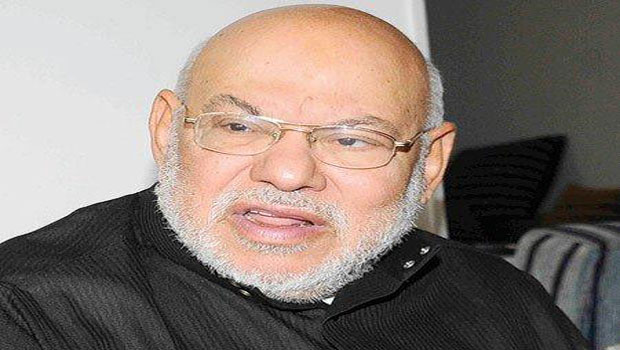The makeup of the 50-member constitutional committee has been the subject of controversy, with the Islamists in particular complaining of a lack of representation. However, Helbawy, a leading Egyptian Islamist who resigned from the ruling Muslim Brotherhood last year, dismissed such claims.
“I believe there is proper representation of the Islamist trend in the 50-member committee, given the presence of [Egyptian Grand Mufti] Dr. Shawky Allam, Dr, Abdullah Mabrouk El-Naggar, Dr. Saad El-Din El-Helali, Dr. Mohamed Abdel-Salam (the consultant of the Al-Azhar Grand Imam), and Dr. Osama El-Azhari,” he said.
Helbawy also told Asharq Al-Awsat that the committee does not intend to “distort Egypt’s Islamic identity whatsoever,” adding, “What is being said in this regard is nothing more than unfounded speculation.”
When asked whether the committee’s task is to amend or completely revise the controversial, Islamist-drafted 2012 constitution, Helbawy said: “According to the presidential decree, the committee is tasked with amending the constitution; however, [the process of] amendment has no limits and may well cover all articles.”
“The 2013 constitution will be a completely new one. We seek to produce a constitution for all Egyptians, not for any single faction or group,” he added.
As for the time it will take the committee to finalize the constitution, Helbawy said: “According to the presidential decree, the 50-member committee is tasked with finalizing the amendments in 60 working days . . . and everyone is seeking to finish on time.”
Helbawy also denied that Islamists working on the committee will attempt to restrict personal freedoms. He said: “There is no intention to restrict freedoms; rather, there is an intention to expand them,” adding, “There are certain suggestions to minimize the powers of the president as well as to hold him and all officials to account.”
Regarding the post-June 30 political situation in Egypt, Helbawy said that “it is clear that a popular, corrective revolution took place in Egypt,” adding that the Mursi administration had failed to deal with the June 30 protests, viewing the protests as a “storm in a teacup.” But Helbawy said they were a “huge revolution that raised the same slogan that was raised in the January 25 revolution: ‘The people and the army are one hand.’”
He added that “the army intervened to protect this revolution, as it intervened to protect the first revolution, but the Islamists believe that the army’s intervention was a coup and they have worked to spread this view.”
Commenting on the current state of polarization and instability in Egypt, Helbawy laid the blame on his former comrades: “For the first time, the flag of Al-Qaeda has been raised in Cairo . . . and the Brotherhood must bear the burden of the violence that has fallen on the [Egyptian] people and police, particularly the events in Aswan, Karadsa and elsewhere.”
However, Helbawy said that attempts to isolate and exclude the Brotherhood would backfire, though he said that the organization has only itself to blame for its current predicament.
Helbawy said: “The Brotherhood’s absence from the scene will not resolve the crisis, but will further complicate the situation, and the Brotherhood leadership are responsible for this—both those in prison and those on the run—since they deviated from the centrist approach, and so because of their coup against themselves, they lost the sympathy of a broad base of the Egyptian people who stood with them during the elections.”
Instead, he called on the organization to accept that it had made mistakes, and to attempt to defuse the situation by returning to the political process.
“The Brotherhood should have accepted their political defeat, acknowledge their poor performance [in government], and revise their project and ideas, which are based on the project of Imam Hassan Al-Banna,” he said.
“They should also have sincerely apologized to the Egyptian people and completely renounced violence, rather than opening the gates for it through the ‘alliance for legitimacy’ and turning the rivalry into a religious conflict,” he added.
Responding to whether the Brotherhood has failed, Helbawy said that due to “fatal mistakes, the Brotherhood failed particularly in the presidency, the Guidance Bureau, and the leadership of the Freedom and Justice Party.”
According to Helbawy, “The biggest mistake [they made] was failing to make good on the promises and pledges they made before the elections, especially the ones [President Mursi] made during the first hundred days of his term in office.”
As for the recent court ruling banning all the activities of the Brotherhood and whether it will lead to a backlash, Helbawy said the former Brotherhood considered such a step “extremely dangerous,” given that the group was “banned and dissolved after it was in power.”
Helbawy also denied reports he has ever defended Al-Qaeda’s agenda, making clear that praising the behavior of any of Al-Qaeda’s members, “even [the group’s] leader, does not mean at all defending [the group’s] behavior and terrorists acts.”

